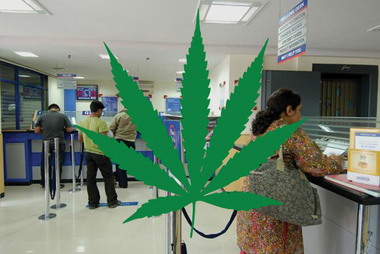You won’t get a mortgage with marijuana money

by Ken Townsend
Senior Editor
Oklahoma has now joined Arkansas in the South-Central region in passing a medical marijuana bill, and other states could soon follow. Once dispensaries and farms begin a business, though, they’re faced with a harsh reality about handling all the cash.
One of the first things a regular business usually does is to set up a bank account. A business utilizes a bank account to write checks to pay bills, pay employees, pay taxes and generally to help keep a good accounting of where the money goes.
Unfortunately, for marijuana-related businesses, their employees, or anyone who derives income from cannabis in any way, it’s not that simple. Marijuana, despite 31 states having legalized it, is still illegal under Federal law.
Banks are regulated under Federal law and are prohibited from providing any banking services to business or individuals having anything to do with the marijuana business, even if it is legal in the state.
The Gayly spoke with Lanell Long, a mortgage lending officer from Great Plains National Bank in Oklahoma City to get a loan officer’s perspective.
“It’s still considered illegal by the federal government,” Long commented.” It’s going to be hard for marijuana-related businesses to do banking in Oklahoma. Banks will have to be very careful because they can be prosecuted for money-laundering.”
The Financial Crimes Enforcement Network of the Treasury Department issued guidance in 2014 to banks on how to handle marijuana business deposits. The banks must first know their customers. Then, all cash transactions in and out of the bank accounts must be reported to the department, and that information is forwarded to law enforcement.
Prosecution would be at the discretion of law enforcement.
Not only are bank accounts legally unavailable to the growers and retailers, but Federal law also makes prescribing cannabis, even in low doses, illegal.
Physicians who write prescriptions could expose themselves to serious legal consequences under the Controlled Substance Act which still has marijuana classified as a Schedule I (one) drug. Physicians may only recommend, not prescribe.
Also involved are the people who work for the growers or retailers. Those involved in the industry in Colorado issue a pay stub along with a cash payment to their employees for their wages.
But the banks are obligated by law to report large and/or multiple cash deposits to the Treasury Department as suspicious activity, so individuals must be careful with cash or risk having their bank accounts closed or possibly seized.
“Current law hinders people’s ability to business, even though they are legitimately doing business,” Long said. “If you wanted to get a mortgage you have to provide pay stubs. Cash is not an accepted form of proof of income for a mortgage.”
Oklahoma, Arkansas and all states considering marijuana state laws still have a huge issue with the Federal government. Prosecution by the Feds has been at their discretion and mostly where businesses have been sloppy in their bookkeeping or outright dishonest.
However, it is still discretionary which means things could change at any moment. At the same time, most banks have chosen not to be involved in any way to protect their charter.
A bill was introduced in the U.S. House of Representatives in April of 2017, HB 2215, which would solve these problems, but was subsequently referred to the Subcommittee on Crime, Terrorism, Homeland Security and Investigations in September 2017 and has not yet emerged.
Some workarounds to these problems have been developed and successfully utilized in states that have previously passed marijuana laws.
Sign-up for a free subscription to The Gayly’s newsfeed (www.gayly.com) delivered right to your personal device and read about some of these workarounds in more detail in the coming weeks.
Copyright The Gayly. 8/19/2018 @ 10:19 a.m. CST.





